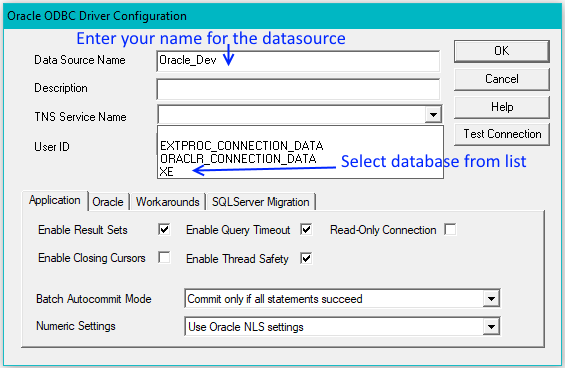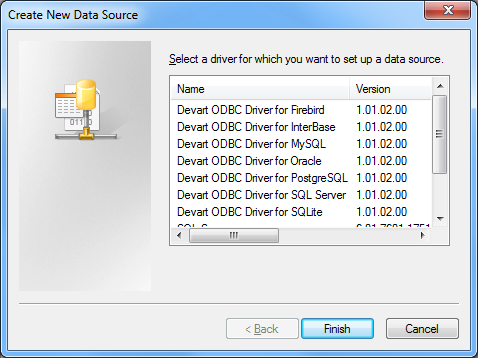Informix SQL data type Informix ODBC driver SQL data type (fSqlType) Description; BIGINT: SQLINFXBIGINT: Signed numeric value with precision 10, scale 0, and range n (–(2 63 - 1) ≤ n ≤ 2 63 – 1). When you have a large number of big spreadsheets to insert as a chore, then speed matters. The ODBC Excel driver (ACE) ODBC was conceived as a way of making it as easy to connect to a particular datasource such a relational database, text file, data document (e.g. XML), web-based data or spreadsheet. Using the ODBC Driver¶ Configure your system to use the ODBC driver by setting up a DSN. A DSN holds configuration information about your BI Connector instance, including server address, port number, and login credentials. The first 'SQL Server' ODBC driver still ships as part of Windows Data Access Components. This driver isn't recommended for new development. Starting in SQL Server 2005, the SQL Server Native Client includes an ODBC interface and is the ODBC driver that shipped with SQL Server 2005 through SQL Server 2012. ODBC Driver now includes the version number in the driver name when OCIATTRDRIVERNAME is set, such as ODBCCLNT: 12.2.0.1.0. (Bug 21795969) (Bug 21795969) Oracle ODBC driver truncated an output parameter of SP when run from 12.1.0.2.
The odbc package provides a DBI-compliant interface to Open Database Connectivity (ODBC) drivers. It allows for an efficient, easy way to setup connection to any database using an ODBC driver, including SQL Server, Oracle, MySQL, PostgreSQL, SQLite and others. The implementation builds on the nanodbc C++ library.
ODBC drivers can typically be downloaded from your database vendor, or they can be downloaded from RStudio when used with RStudio professional products. The odbc package works with the DBI
Using
All of the following examples assume you have already created a connection called con. To find out how to connect to your specific database type, please visit the Databases page.
Database information
The odbc package gives you tools to explore objects and columns in the database.
You can also see other data sources and drivers on the system.
Reading and writing tables
The DBI package has functions for reading and writing tables. dbWriteTable() will write an R data frame to a SQL table. dbReadTable() will read a SQL table into an R data frame.
You can specify tables outside the database with the Id() command.
Queries and statements
For interactive queries, use dbGetQuery() to submit a query and fetch the results. To fetch the results separately, use dbSendQuery() and dbFetch(). The n= argument in dbFetch() can be used to fetch partial results.
You can execute arbitrary SQL statements with dbExecute(). Note: many database API’s distinguish between direct and prepared statements. If you want to force a direct statement (for example, if you want to create a local temp table in Microsoft SQL Server), then pass immdediate=TRUE.
odbc Performance Benchmarks
The odbc package is often much faster than the existing RODBC and DBI compatible RODBCDBI packages. The tests below were carried out on PostgreSQL and Microsoft SQL Server using the nycflights13::flights dataset (336,776 rows, 19 columns).
PostgreSQL Results
| Package | Function | User | System | Elapsed |
|---|---|---|---|---|
| odbc | Reading | 5.119 | 0.290 | 6.771 |
| RODBCDBI | Reading | 19.203 | 1.356 | 21.724 |
| odbc | Writing | 7.802 | 3.703 | 26.016 |
| RODBCDBI | Writing | 6.693 | 3.786 | 48.423 |
Microsoft SQL Server Results
| Package | Function | User | System | Elapsed |
|---|---|---|---|---|
| odbc | Reading | 2.187 | 0.108 | 2.298 |
| RSQLServer | Reading | 5.101 | 1.289 | 3.584 |
| odbc | Writing | 12.336 | 0.412 | 21.802 |
| RSQLServer | Writing | 645.219 | 12.287 | 820.806 |
Syntax
Description
The Get-OdbcDriver cmdlet gets installed Open Database Connectivity (ODBC) drivers from the computer.Specify values for the Name and Platform parameters.If you do not specify a value for Name, the cmdlet gets drivers that have any driver name.If you do not specify any parameters, the cmdlet gets all ODBC drivers installed on the computer.
For more information about ODBC and drivers, see Microsoft Open Database Connectivity (ODBC) and Drivers on the Microsoft Developer Network.
Examples
Odbc Driver Numbers Search
Example 1: Get all installed ODBC drivers
This command gets all installed ODBC drivers.The cmdlet gets both 32-bit and 64-bit drivers.
Example 2: Get a driver on the 32-bit platform by using a name
This command gets the driver named SQL Server Native Client 10.0 on the 32-bit platform.
Example 3: Get ODBC drivers that begin with a specified string on the 64-bit platform
Odbc Driver Numbers List

This command gets installed ODBC drivers that have a name that starts with SQL Server on the 64-bit platform.
Example 4: Get all ODBC drivers
This command gets all installed ODBC drivers, and then stores them in the $DriverArray variable for future use.
Parameters
Runs the cmdlet as a background job. Use this parameter to run commands that take a long time to complete.
| Type: | SwitchParameter |
| Position: | Named |
| Default value: | None |
| Accept pipeline input: | False |
| Accept wildcard characters: | False |
Runs the cmdlet in a remote session or on a remote computer.Enter a computer name or a session object, such as the output of a New-CimSession or Get-CimSession cmdlet.The default is the current session on the local computer.
| Type: | CimSession[] |
| Aliases: | Session |
| Position: | Named |
| Default value: | None |
| Accept pipeline input: | False |
| Accept wildcard characters: | False |
Specifies the name of a driver.You can use wildcard characters to specify more than one driver.This cmdlet gets one or more ODBC drivers that this parameter specifies.If you do not specify this parameter, this cmdlet gets all ODBC drivers.
| Type: | String |
| Aliases: | DriverName |
| Position: | 0 |
| Default value: | None |
| Accept pipeline input: | True |
| Accept wildcard characters: | False |
Specifies the platform architecture.This cmdlet gets ODBC drivers that belong to the architecture that this parameter specifies.The acceptable values for this parameter are:
- 32-bit
- 64-bit
- All
The default value is All.If you run this cmdlet in a remote CIM session, this parameter refers to the platform architecture on the remote computer.
| Type: | String |
| Accepted values: | 32-bit, 64-bit, All |
| Position: | Named |
| Default value: | None |
| Accept pipeline input: | True |
| Accept wildcard characters: | False |
Specifies the maximum number of concurrent operations that can be established to run the cmdlet.If this parameter is omitted or a value of 0 is entered, then Windows PowerShell® calculates an optimum throttle limit for the cmdlet based on the number of CIM cmdlets that are running on the computer.The throttle limit applies only to the current cmdlet, not to the session or to the computer.
| Type: | Int32 |
| Position: | Named |
| Default value: | None |
| Accept pipeline input: | False |
| Accept wildcard characters: | False |

Odbc Driver Numbers Lookup
Outputs
CimInstance[]
Comments are closed.